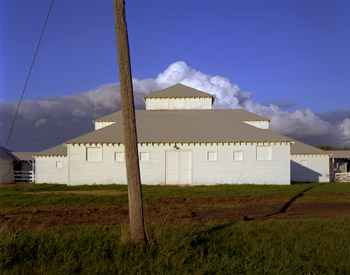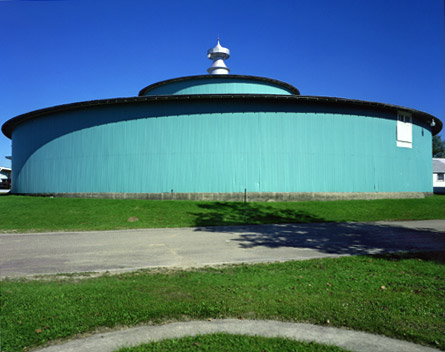Monday, January 1, 2007, 09:01 AM

Mahnomen County Fairgrounds, Mahnomen Minnesota 1980
In his blog on documentary photography 2point8.whileseated.org Michael David Murphy raises the issue of street photography from photographers who are primarily using large format in the Getty exhibit Where We Live Photographs of America from the Berman Collection. If you look back to the 50s and 60s it really was Frank, Friedlander, Winogrand, Arbus and the street photographers who carried on the FSA tradition of Evans and Lange. It therefore should not be too surprising to see their influences in work from the 70s to today - even those of use who use sheet film cameras.
When I was a student Lee Friedlander would stop by to visit his old friend, and my mentor, Jerry Liebling. He had been a visiting instructor at the University of Minnesota a few years earlier and his influences were still widely felt in the late 60s and early 70s. It was hard to ignore, even if you were, like me, more drawn to Pop Art than street photography. I often feel a bit of Friedlander - it is most obvious in my photo of Mahnomen in the Getty show. But you can not pick up a camera, turn it on the real world, and not be aware of those who stalked the streets with a Leica.
It is also nice that Murphy picked up on Sheron Rupp's work. In a show of great photographs her work stands strong and tall.
[ add comment ] | permalink
Thursday, December 14, 2006, 12:06 PM
John Turula, a sculptor who's work I must confess graces my front yard, back yard and the steps leading up to our front door has been doing a Web site of some of the artists that live along the Mississippi River here in Western Wisconsin. He has chosen me as his artist of the month this month. John also ran a short lived gallery - Gallery EE, that was listed as one of the 10 best undiscovered places to view art near the Twin Cities. Alas, it is gone but his site is worth a look to get a sense of what some of us along the backwaters are doing.
http://www.nopointink.com/
By the way, he explains what No Point means on the site. It is point on the river, that is really not a point at all. Get the point?
[ add comment ] | permalink
Wednesday, December 6, 2006, 11:49 AM
The blog TinyWindows has a short review of the Where We Live Getty show. He has also picked out two books he really likes: As a lover of postcards I found his book pick of Real Photo Postcards very interesting. It is worth a good look. Also his Non Facturé: Rejected Photographs on rejected snapshots looks wonderful! I do not know who the blogger is, he remains anonymous, but he has a real understanding of the vernacular.
ltinywindows.wordpress.com/
[ add comment ] | permalink
Sunday, November 19, 2006, 03:50 PM
This weekend's newspapers feature three articles about the Getty Center's Where We Live: Photographs of America from the Berman Collection. In the San Diego Union Robert Pincus focuses in part on the Walker Evans influence on many of us. This should not be surprising since Bruce Berman has made it very clear that he began his collection looking for that very influence. In my case it came from going through a box of original Evans prints that the Minneapolis Institute of Arts had received for a show they were organizing in the mid 70's. (Curatorial policies were a bit looser in those days; I frequently would visit the MIA photo department and be handed recently arrived photos to look at or would sit down with a vintage copy of Camera Work magazine and read it like last months Popular Photography).
The Walker Evans prints were from collector Arnold Crane, who had purchased much of Evans' well known work in the late 60's and was offering it to museums. (The Getty also purchased work from this collection a few years later). Seeing the work first hand had a deep impact on me. Although I had been out of grad school three years, and teaching photography - including photo history - for five years, I finally got it. I understood for the first time what Evan's was up to. He was photographing for history, not just creating Government sponsored feeds for the contemporary media.
The second is by Nancy Ganiard Smith from the Palisadian Post from Pacific Palisades. It looks at the show as a meandering trip through overlooked American life. She sees the show as an "off-the-beaten-path road trip through the United States. The 170 images by 24 contemporary photographers tell of beauty, loss, decay, hope and desire with voices as disparate as the country itself."

The third article this weekend is one of those hometown boy does well in the big city articles from my local paper by Ruth Nerhaugen. It is a bit ironic that one of the images in the show is of the Pierce County Fairgrounds in Ellsworth Wisconsin. (Which is reproduced for the article and above). It was taken 4 years before I moved to rural Wisconsin in Pierce County. At the time I had no idea it would one day be from "my own fair." Like many of the buildings pictured in the exhibit it has undergone changes in the past 10 years; it was repainted a different color a few years back.
San Diego Union by art critic Robert Pincus
Palisadian Post from Pacific Palisades
Red Wing Republican Eagle by Ruth Nerhaugen.
[ add comment ] | permalink
Friday, November 17, 2006, 09:46 PM

In the November 3rd article from the online version of the Economist magazine the author writes on the Getty opening for Where We Live. It was a very posh event - certainly the best opening I have ever been to - and I have been to LOTS of them. But I did not think it was excessively off the charts when it comes to an opening of a major exhibition.
The writer raises the question if most of those in attendance that night had ever seen much of what was depicted on the walls. He may be correct, however is that so much a question of ignoring large portions of society, or is it more a question of geography? Most of the exhibit, and indeed much of where America lives, is after all, in fly-over land. Unlike most of human history, Americans now have the freedom to travel beyond 25 miles from where they were born. Yet how many people really do so on a regular basis outside of visiting other places just like home, or tidy safe vacation hot spots?
Although a good portion of the images in the show were made in close vicinity to where the photographers lived, I suspect that most of us travel rather extensively. (In fact that was one of the discussions amongst some of the photographers at the opening). I suspect that like the author we have a curiosity about life beyond our own back yards and have seen these places (or at least ones like them) first hand. But I am afraid for most people, they would rather experience life vicariously.
So called "reality" TV may be the current network programing du jour - but let's not forget that Marie Antoinette went so far as to create a faux "peasant play-village" at Versailles when real peasants were starving all over France. (I am reminded of the Curb Your Enthusiasm episode where a TV "Survivor" meets a Holocaust survivor and tries to argue how difficult life on the island really was!)
True, the art world sometimes goes a bit overboard in embracing art and artists that celebrate the underbelly of life. But I do not see this exhibition doing that. What I personally have problems with are photographers who demean their subjects for their own ends. Unfortunately it is all too common today; but fortunately that is not something I sensed in the work in this exhibit.
My only complaint about those in attendance is that I hope they actually return to see the show. An opening (particularly one that was that good) is not the time to look seriously at art work.
On Leaving Los Angeles from the Economist.com
[ add comment ] | permalink
Back Next






